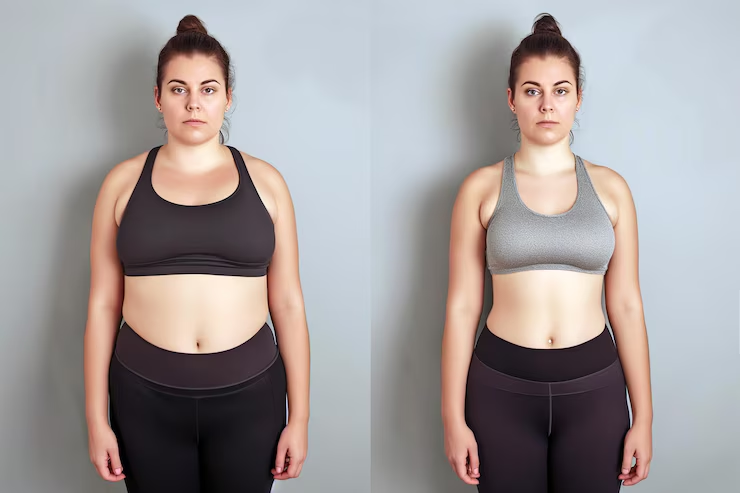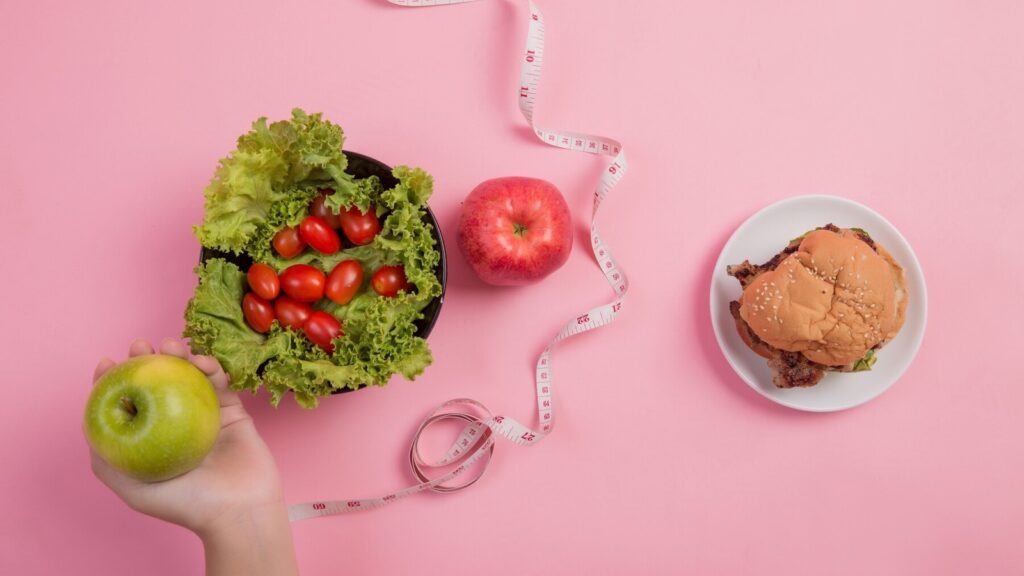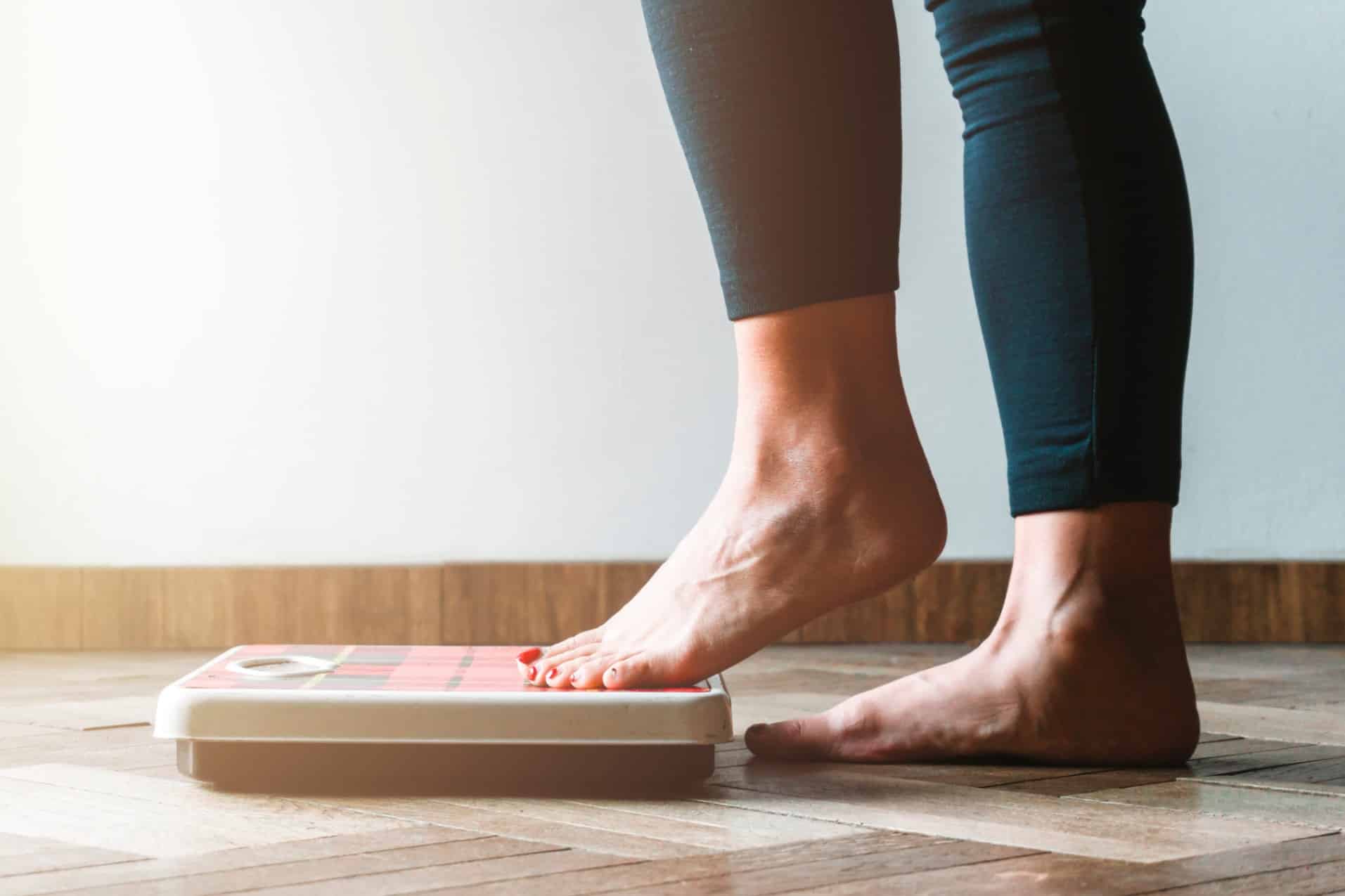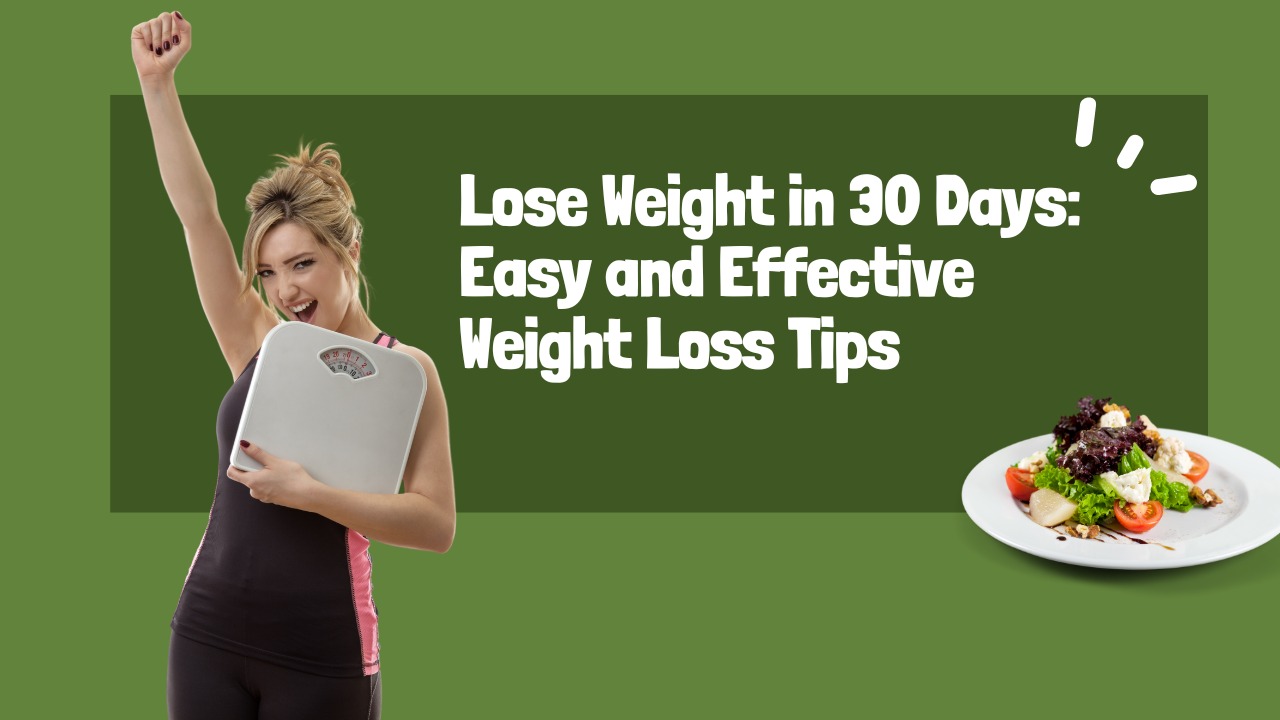Looking to lose weight in 30 days? Whether you’re preparing for a big event or aiming to improve your health, a month is enough time to make visible progress. By understanding how your body burns calories and stores fat, you can take control of your weight loss journey.
The key to success lies in combining a nutritious diet with regular physical activity. Focus on whole foods, lean proteins, and plenty of vegetables while cutting back on sugars and processed meals. Pairing this with a consistent workout routine—such as cardio, strength training, or even daily walks—can help boost your metabolism.
Finally, adopting healthy lifestyle habits like staying hydrated, getting quality sleep, and managing stress plays a crucial role. These small changes, practiced daily, can lead to real, lasting results. With dedication and the right plan, you can lose weight in 30 days safely and effectively.
Weight Loss: The Basics

To lose weight in 30 days, it’s important to understand how weight loss works. At its core, weight loss occurs when you burn more calories than you consume. This creates a calorie deficit, prompting your body to use stored fat for energy. The greater the deficit, the more weight you can lose—safely and steadily.
Your metabolism plays a major role in how quickly you burn calories. Factors like age, gender, muscle mass, and activity level all affect your metabolic rate. Strength training and regular exercise can boost your metabolism, helping you burn more calories throughout the day, even at rest.
Nutrition is another crucial factor. Eating nutrient-dense foods such as lean proteins, whole grains, vegetables, and healthy fats supports weight loss while keeping you energized. Avoiding processed foods, sugary drinks, and excessive carbs is essential when trying to lose weight in 30 days.
Lastly, sleep and stress management are often overlooked. Poor sleep and high stress can disrupt hormones that regulate hunger and fat storage. A balanced lifestyle supports your goal to lose weight in 30 days and maintain long-term health.
How can you effectively lose weight in 30 days without compromising your health ?
Set Realistic Goals
When trying to lose weight in 30 days, it’s essential to set realistic and achievable goals. A healthy and sustainable weight loss rate is typically 1 to 2 pounds per week. Expecting to lose 20 pounds in a month may lead to disappointment or unhealthy habits. Instead, focus on steady progress and building better lifestyle choices.
Start by defining specific, measurable goals such as losing 5–8 pounds, exercising 4 times a week, or replacing sugary snacks with healthier options. These manageable steps help you stay motivated and on track. By keeping your goals realistic, you’re more likely to succeed and maintain the results after the 30 days are over.
Create a Caloric Deficit
To lose weight in 30 days, creating a caloric deficit is crucial. This means consuming fewer calories than your body needs to maintain its current weight. When you eat fewer calories than you burn, your body starts using stored fat as energy, leading to weight loss over time.
You can create a deficit by reducing portion sizes, choosing lower-calorie foods, and increasing physical activity. Aim to cut 500 to 750 calories per day through a combination of diet and exercise. However, avoid extreme calorie restriction, which can slow your metabolism and cause fatigue. A balanced approach ensures steady weight loss and supports your health throughout your 30-day journey.
Track Your Calories One of the easiest ways to monitor your caloric intake is by tracking what you eat. Apps like MyFitnessPal can help you track your meals, snacks, and drinks, ensuring that you stay within your calorie goals. Be mindful of portion sizes, as even healthy foods can contribute to weight gain if consumed in excess.
Focus on a Balanced, Nutrient-Dense Diet
To lose weight in 30 days, prioritize a balanced, nutrient-dense diet that fuels your body while promoting fat loss. Focus on whole foods like lean proteins, vegetables, fruits, whole grains, and healthy fats. These foods keep you full longer, stabilize blood sugar, and support metabolism.
Avoid processed foods, sugary drinks, and empty-calorie snacks that add little nutritional value. Instead, prepare meals at home using fresh ingredients and control your portion sizes. Eating mindfully and including a variety of nutrients in your diet not only helps you lose weight in 30 days but also builds habits for long-term health and wellness.

Macronutrients Your diet should consist of three main macronutrients: carbohydrates, proteins, and fats. Each plays an essential role in your body, especially when trying to lose weight.
Proteins: Protein is critical for building and maintaining muscle mass. It also helps control hunger and boosts metabolism. Include lean sources of protein like chicken breast, fish, eggs, tofu, and legumes.
Carbohydrates: While some people opt for low-carb diets, it’s important to choose the right type of carbohydrates. Focus on complex carbs such as whole grains (quinoa, brown rice), vegetables, and fruits. These provide fiber, which aids digestion and helps you feel full.
Fats: Healthy fats are necessary for hormone regulation and brain function. Include sources of healthy fats like avocados, olive oil, nuts, seeds, and fatty fish.
Micronutrients Don’t forget about micronutrients like vitamins and minerals. These help keep your body functioning at its best. Include a variety of colourful fruits and vegetables into your meals to ensure you get a wide range of nutrients. Aim for 5–7 servings of fruits and vegetables per day.
Hydration Drinking plenty of water is crucial for weight loss. Water helps with digestion, reduces hunger, and supports metabolism. Aim to drink at least 8 glasses (2 liters) of water per day. You can also include herbal teas or infused water with lemon, cucumber, or mint for variety.
Exercise for Maximum Results
To lose weight in 30 days, exercise is just as vital as diet. A mix of cardio and strength training helps burn fat, build muscle, and boost metabolism. Regular physical activity not only supports weight loss but also improves overall fitness, energy levels, and mood throughout your 30-day journey.
Cardio Exercise Cardiovascular workouts like walking, running, or cycling burn calories and improve heart health. Aim for 150 minutes of moderate or 75 minutes of vigorous cardio each week. HIIT is a great option if you’re short on time, helping you burn more calories quickly and efficiently to lose weight in 30 days.

Strength Training Strength training builds lean muscle, which boosts your resting metabolism. Try squats, lunges, push-ups, or weightlifting at least 2–3 times weekly. Muscle helps your body burn more calories throughout the day, even at rest—making it a powerful tool to lose weight in 30 days.
Consistency Consistency is essential for results. Even short, regular workouts are more effective than occasional intense sessions. Create a schedule that fits your lifestyle and stick to it. A steady, committed approach will help you stay on track and successfully lose weight in 30 days.
Prioritize Sleep and Stress Management
To lose weight in 30 days, you must look beyond just diet and exercise—quality sleep and effective stress management are just as important. Poor sleep and high stress levels can disrupt your hormones, increase cravings, and lead to emotional eating, all of which can stall your weight loss progress.
Sleep Getting 7–9 hours of restful sleep each night is essential when trying to lose weight in 30 days. Inadequate sleep increases levels of ghrelin (hunger hormone) and reduces leptin (fullness hormone), making you more likely to overeat. It also slows your metabolism and reduces energy levels, which can hinder your workout performance and overall progress.
Stress Management Chronic stress can lead to emotional eating and increased fat storage due to elevated cortisol levels. To effectively lose weight in 30 days, incorporate stress-reducing practices such as meditation, yoga, deep breathing, or journaling. These techniques help calm your mind, stabilize mood, and support consistent, mindful eating habits that align with your weight loss goals.
Stay Motivated and Track Your Progress
Staying motivated is essential when trying to lose weight in 30 days. Set short-term goals and celebrate small milestones to keep your spirits high. Remind yourself why you started—whether it’s for better health, confidence, or a special event. Positive reinforcement helps you stay committed and consistent throughout your journey.
Tracking your progress keeps you accountable and helps identify what’s working. Use a journal, app, or photos to record your meals, workouts, weight, and measurements. Seeing your progress, even if it’s gradual, can be incredibly motivating. Regular tracking not only boosts your confidence but also encourages you to stay focused and make necessary adjustments to ensure you continue to lose weight in 30 days effectively.
Avoid Common Mistakes
To lose weight in 30 days effectively, it’s important to avoid common mistakes that can hinder progress or harm your health. Many people unknowingly sabotage their efforts by adopting extreme or unsustainable practices. Staying informed and making smart, balanced choices will help you achieve your goals safely and efficiently.
Extreme Calorie Restriction Drastically cutting calories may seem like a fast way to lose weight in 30 days, but it can backfire. Severe restriction often leads to muscle loss, nutritional deficiencies, and a slower metabolism. Your body may go into “starvation mode,” conserving energy and making it harder to burn fat. Instead, aim for a moderate deficit with nutrient-dense foods to stay healthy and energized.

Over-Exercising While regular exercise is key to weight loss, overdoing it can cause burnout, fatigue, or injury. Excessive workouts without proper recovery stress the body and may lead to inconsistent performance or even quitting altogether. To lose weight in 30 days, balance your routine with rest days, proper hydration, and adequate nutrition to support recovery and avoid setbacks.
Relying on Fad Diets Fad diets often promise rapid results but usually eliminate entire food groups or involve unrealistic rules. These diets are hard to maintain and can result in quick weight regain once you stop. To lose weight in 30 days and keep it off, focus on a sustainable, balanced eating plan that provides essential nutrients without extreme restrictions.
Skipping Meals Skipping meals might seem like a way to cut calories, but it can slow your metabolism and trigger binge eating later. It can also cause energy dips and poor food choices due to increased hunger. To lose weight in 30 days, eat regular, balanced meals that keep you full, support your energy levels, and prevent overeating.
Conclusion
Losing weight in 30 days is a realistic and rewarding goal when approached with the right mindset, consistency, and healthy habits. By understanding the fundamentals of weight loss and focusing on small, daily improvements, you can make meaningful progress within just one month. The key is to stay committed and avoid extreme or unsustainable methods that may harm your health.
To effectively lose weight in 30 days, create a moderate caloric deficit through a combination of healthy eating and regular exercise. Fuel your body with nutrient-dense foods, prioritize strength and cardio workouts, get enough sleep, and practice stress management techniques. These balanced strategies support fat loss while helping you feel energized, focused, and in control of your journey.
Remember, lasting weight loss takes time. While 30 days may not lead to a dramatic transformation, it’s a powerful starting point for long-term success. Celebrate every step forward, no matter how small, and don’t be discouraged by minor setbacks. Stay positive, track your progress, and trust the process. With dedication and patience, you’ll not only lose weight in 30 days—you’ll build habits that last a lifetime.

FAQs
Is it healthy to lose weight in 30 days ?
Yes, losing weight in 30 days can be healthy if done with a balanced diet, regular exercise, and moderate caloric deficit. Aim for gradual weight loss of 1–2 pounds per week to avoid health risks and support sustainable results.
How much weight can I realistically lose in 30 days ?
Most people can safely lose between 4 to 8 pounds in 30 days by following a consistent plan of healthy eating and exercise. Individual results vary based on metabolism, starting weight, and lifestyle.
Can I lose weight in 30 days without exercising ?
While exercise boosts calorie burn and metabolism, you can still lose weight in 30 days by focusing on diet alone. However, combining exercise with healthy eating improves results and overall health.
What type of diet is best to lose weight in 30 days ?
A balanced, nutrient-dense diet rich in lean proteins, vegetables, whole grains, and healthy fats is best. Avoid fad diets or extreme restrictions for sustainable weight loss.
How important is sleep when trying to lose weight in 30 days ?
Sleep is very important. Getting 7–9 hours of quality sleep helps regulate hunger hormones, supports metabolism, and reduces stress, all of which are essential for effective weight loss.

